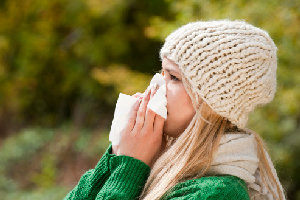Your nose is stuffy, eyes feel itchy and you're sneezing more than usual. At the same time, you're not sick. You may notice these symptoms at certain times of the year when you're exercising or competing outdoors.

If you have seasonal or year-round symptoms that include nasal congestion, sneezing and an itchy or runny nose, you may suffer from seasonal nasal allergies called allergic rhinitis. See your doctor or an allergy specialist to know for sure. Treatment options can help alleviate symptoms so you can maintain your sports performance during times when symptoms are more bothersome.
If you're diagnosed with a seasonal allergy, using pollen count information may help with symptom control.
Pollen count is the number of pollen grains in a standard volume of air (cubic meter) over 24 hours at a specified time and place. Pollen counts are usually reported as low, medium, high or very high and may change daily. A high pollen count doesn't always mean your symptoms will be worse than when it's low.
You can usually find pollen count information in local television newscasts, in your local newspaper or online.
Pollen counts are beneficial, but they do have limitations.
Most pollen counters are placed on building roofs to collect air samples. Pollen adheres to the device; each type of pollen is counted; and calculations are made estimating the amount of pollen in the air. Many variables affect pollen collection such as time of day, weather conditions, area sampled and local plant types in that area.
If you know what type(s) of pollen to which you're allergic, use pollen counts to control your symptoms. Pollen count may help you decide to take an oral antihistamine before exercising outdoors or train indoors. Several daily medications, taken by mouth or nasal spray, are available to help control allergic rhinitis symptoms. Talk with your doctor to know what may work best for you.
Article submitted by Sports Medicine Physician Laurel Rudolph, M.D., Marshfield Clinic Marshfield Medical Center.
Share comments or questions on this story. Email sports.medicine@marshfieldclinic.org
